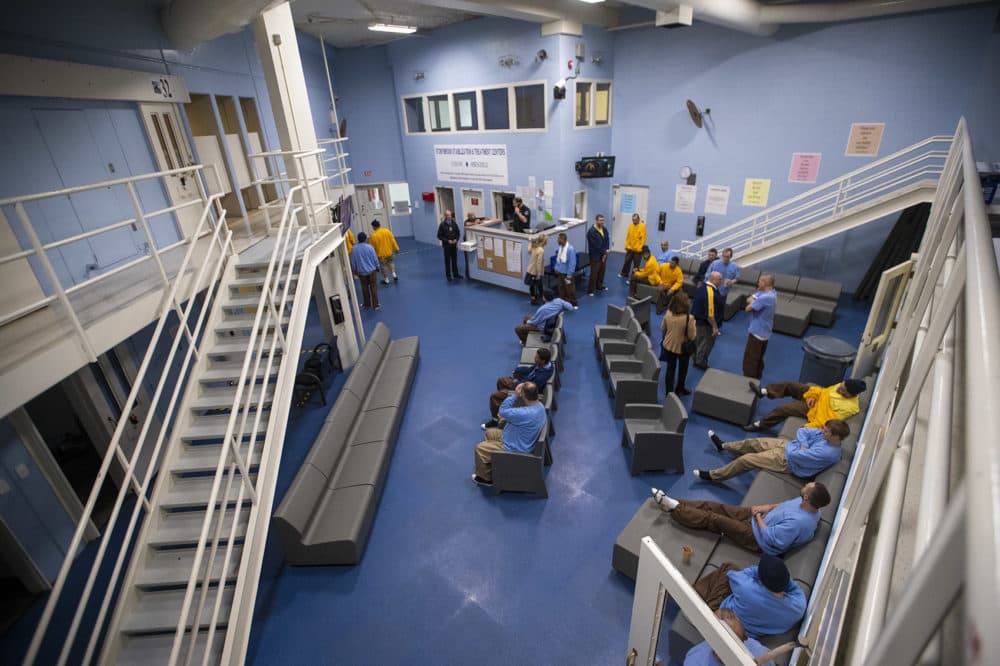Advertisement
Section 35 Panel Recommends Mass. End Civil Commitments To Prisons, Jails

How Massachusetts involuntarily commits people to addiction treatment is likely to change after much debate about one of the most visible intersections of the public health and criminal justice systems.
A state commission has released its final recommendations about the civil commitment process under the state law known as Section 35.
With more than 5,700 involuntary commitments to addiction treatment in the last fiscal year, Massachusetts is a state where these types of commitments are widely used. It’s also believed to be the only state that sends civilly committed men to jails and prisons for treatment, even though they haven’t committed any crimes. But that part of the process may be the most visible thing to change after a majority of Section 35 commission members voted to recommend that the state be prohibited from sending people to correctional facilities for addiction treatment.
Right now, a loved one, police officer or court officer can ask a judge to involuntarily commit someone to addiction treatment. The judge then reviews a court clinician's evaluation, and if the judge determines that the person's substance use is dangerous, the person can be sent to treatment for up to 90 days.
Three of the four Section 35 facilities for men are in jails and prisons. In settling a lawsuit in 2016, the state agreed to stop sending women to correctional facilities for treatment. The state is facing a similar lawsuit over the practice of sending men to jails and prisons for treatment, which prompted several Section 35 commission members to abstain from voting on the panel's final recommendations.
"Because of the lawsuit those of us in the executive branch cannot take a position on the recommendations," said state Health and Human Services Secretary Mary Lou Sudders, who chaired the 29-member Section 35 commission.
Commission member and state Rep. Ruth Balser also filed legislation to end the practice of using jails and prisons for Section 35 commitments.
"The simple truth is that people with addiction are sick, they're not criminals," Balser said. "People who are sick shouldn't be sent to jail. They should be sent for health care."
Commission member and state Rep. Michael Finn was the only member who opposed barring the state from committing to people to drug treatment facilities inside correctional facilities. His district includes the Hampden County Jail, where the sheriff opened a wing of the jail for Section 35 commitments last year.
"This has been good for western Massachusetts," Finn said during the commission's last meeting in June. "The sheriff has been doing a good job, and the program has proven to be successful."
Advertisement
Hampden County Sheriff Nick Cocchi testified before the commission earlier this year and said his program differs from others in correctional institutions — in part because of the recovery network and support services in the western part of the state. The sheriff also said law enforcement must step in to deal with the opioid epidemic.
"The responsibility of the sheriff's office has evolved from care while in custody to prevention before incarceration," the sheriff wrote in a PowerPoint presentation to the commission.
The commission also tried to get at the question of whether forced treatment is successful. The members reviewed studies, but they had mixed results. The panel did not review data from the state Department of Correction, which oversees MASAC, the Massachusetts Alcohol and Substance Abuse Center. The former prison in Plymouth opened two years ago and is the largest Section 35 facility in the state. The majority of the commissioners voted to recommend that the state collect more data and better define whether Section 35 is effective and for whom.
"The state really dragged its feet on producing the kind of analysis that would be able to assess whether or not addiction treatment that's coerced produces a heightened overdose risk versus voluntary treatment, " said Leo Beletsky, a commission member and Northeastern University professor. "We still don't have a good sense of what's going on inside correctional facilities or how those patients are being treated."
Another recommendation seeks to minimize the use of courts in the civil commitment process. It asks the state to look at alternative paths — in addition to the courts — to commit people to treatment. The commission repeatedly heard that some people seek a Section 35 commitment because it's a way to get immediate, free addiction treatment for themselves or a loved one.
"The courts don't deal with voluntary treatment," said Massachusetts Trial Court Chief Justice Paula Carey, who also sat on the commission. "If it's voluntary, they don't need to be in court."
The recommendations now go to lawmakers for potential implementation.
